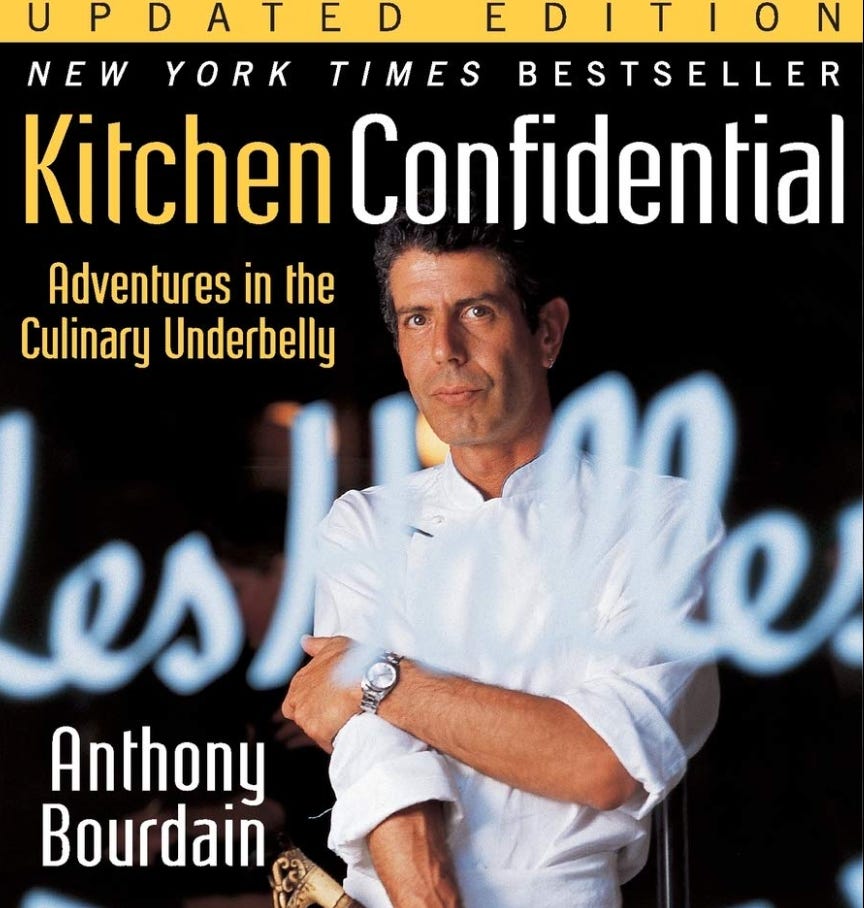My 15-year-old daughter is starting to look at colleges, and she’s so incredibly overwhelmed that I’m tempted to slip an edible into her milk. (KIDDING!)
The problem is that she’s trying to game her future 45 steps ahead. If University X is ranked higher than University Y, will I get into med school? But if University X is more expensive than University Y, will I be able to *afford* med school? There is a pervasive sense that if she chooses wrong she might end up under a bridge — or worse, in B2B marketing.
But here's what I tell her — and what I'm telling myself as I watch AI reshape our industry: things change, and you can't optimize for the unknown. You can only get really, really good at adapting.
What’s the best decision you can make today with the information you have?
With AI here to stay for now, how do we take the right next steps to make it to the other side and not plunge off the cliff?
💡 Actionable Tip: Feed the b***h
In Kitchen Confidential, Anthony Bourdain recalls a time earlier in his career where he was working in some NYC restaurant. The baker at said restaurant was a bit of a character, and he had a love/hate relationship with his sourdough.
Sourdough needs constant attention. This baker had to “feed” it water and flour multiple times a day, including in the wee hours of the morning, leading to the common refrain of “feed the bitch!”
I use Claude a lot, and I find the more that I “feed” it with context, the better it does. In the age of AI slop, curation is suddenly becoming a really valuable skill.
I’ve created multiple projects (custom GPTs, if you’re using ChatGPT). Projects allow you to provide detailed background information, including instructions, files, and text documents, along with the prompt, so that you can create a specialized “job” that each product performs.
Some of mine include content writing for different formats, a strategic thought partner for brainstorming, and a copywriter with “expertise” in various conversion copywriting strategies.
What is super important is that as I create new artifacts (briefs, messaging documents, strategic plans) and new content (the outputs of those artifacts), I’m consistently updating my projects with them. Sometimes I’ll take out outdated strategy docs too.
To keep the kitchen metaphor going, I need to plant the right seeds and tend the garden so that it creates the ingredients I need for my farm-to-table dinner.
Here’s a (sourdough) starter kit you might want to pull from for various projects:
OKRs: company and marketing
PMM docs: Core messaging structure, positioning, competitor analysis
Website copy
Top content pieces (thought leadership and research especially)
Sales decks
Product artifacts (feedback, roadmaps, etc.)
This has become a really important part of my process, and it helps create a system that rewards me with better outputs. Do I still need to edit? OF COURSE. But what I get is much closer to what I need to work with as a first draft.
You wouldn’t want to work from no context as a content writer… so why should AI? If you want your AI content to keep getting better, you need to feed the bitch.
🚫 Anti-Pattern: Business as usual
I’ve debated sharing this because it’s painful to write: I'm getting content back from Claude that is better researched, more sharply written, and more strategically nuanced than what I see from most freelancers charging $800-1000 per blog post.
I can feed my AI project a customer interview transcript, competitor analysis, and product positioning doc, then ask for a piece that addresses three specific pain points while subtly positioning our solution. What comes back isn't just serviceable — it's pretty good.
Too many content marketers are still operating like it's 2015, thinking that showing up and doing "content marketing" is enough. It's not. Not anymore.
AI can research faster than you, write cleaner than you, and optimize better than you. If all you're bringing to the table is the ability to string sentences together around industry keywords, you're about to become extinct.
The content marketers who survive and thrive are the ones who understand that their value now lies far beyond just creating content.
They are expert interviewers who can extract gold from the most reluctant SMEs. Critical thinkers who can spot market gaps that everyone else misses. Seasoned strategists who understand how content ladders up to business objectives. Cross-functional diplomats who can navigate competing priorities without making enemies.
These are the content marketers building moats around their roles — not because they can outwrite a machine, but because they can out-think, out-connect, and out-strategize in ways that no algorithm ever will.
💡 Big Idea: The foundations still apply
When executives view content as a cost center — which, let's be honest, most still do — they'll always choose the cheapest option. And right now, that cheapest option is getting pretty damn sophisticated.
But this moment we're living through — where machines can suddenly do the thing we thought made us special — is just revealing what was always true:
Content marketing is not the same thing as content production.
The content marketers who were already thinking strategically, who were already building relationships, who were already proving their worth beyond word count?
They're not panicking. They're adapting.
AI can write, but it can't think like a business leader. It can't read the room. It can't build relationships across departments or navigate office politics or earn trust through consistent delivery.
Real marketing has always meant understanding the business and market so deeply that your path forward becomes inevitable. It’s always been about being so plugged into customer needs, market dynamics, and organizational goals that people can’t imagine making decisions without you in the room.
So here's what I want you to understand: if you've been coasting on your ability to write pretty sentences, yes, you're in trouble. But if you've been doing the real work — the hard, relationship-building, strategy-setting, insight-generating work that makes businesses better — then congrats! You just got handed a really powerful research assistant and writing partner.
The tools have changed, but the fundamentals remain the same: understand your audience, solve real problems, measure what matters, and never stop proving your worth.
Ready to build those unshakeable foundations? My course Bending the Spoon teaches content marketers exactly how to prove their value, gain executive buy-in, and become strategically indispensable — AI or no AI. Because when you master the business of content marketing, the technology becomes just another tool in your badass toolkit.
Yours in contention,
Lauren









